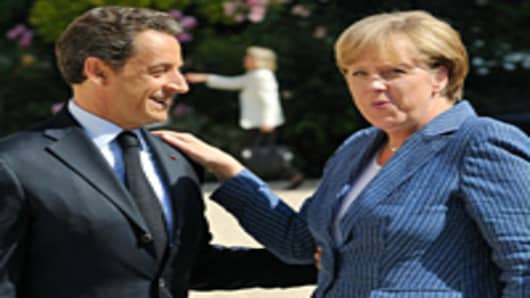The latest proposed fixes for the euro crisis disappointed markets and sent the stocks of banks and exchanges tumbling.
German Chancellor Angela Merkel and French President Nicolas Sarkozy, following a meeting in Paris, announced a proposed framework to forge a closer fiscal governance bond between the 17 members of the euro zone.
They also agreed to float proposals in September for a tax on financial transactions, but revealed no details.
Banks, already under pressure, took another leg down and exchange stocks, like NYSE Euronext and Intercontinentalexchange fell sharply.
UBS , Deutsche Bank and Citigroup were all lower, as was the XLF , financial Sector SPDR Fund ETF.
What most disappointed markets was that they ruled out any immediate plans to issue joint euro bonds. They also made clear they believed the EU bailout fund—known as the European Financial Stability Facility—is of sufficient size to handle the sovereign debt problems, which also disappointed the markets.
"It turned the tape," said one trader. "I think the inaction on the EFSF, and the comment that it was fully funded, the fact there was no eurobonds and certainly floating a transaction tax was the thing that hit the banks and exchanges."
Banks also moved lower on concerns the EFSF bailout fund would not be big enough to handle future problems, allowing the sovereign crisis to move into the banking system.
Merkel called the idea of a eurobond a "last resort."
"What we are opposing here is the means with which we can solve the crisis right now and win back trust, step by step...I do not think euro bonds will help us in this," Merkel said.
The euro zigzagged on news of the proposal, which calls for all 17 countries to commit to balanced budgets by mid 2012 and a more coordinated corporate tax system.
"It looks like they are making strides in the longer term picture in coming to a more coordinated fiscal integration but we're talking something years down the road," said Brian Dolan of Forex.com. "They likely are going to impose a eurozone tax. We don't think the financial sector would take that news kindly. It means France and Germany plan to support the banking system but they are going to charge them for it."
Sarkozy said he and Merkel wanted to create a "true European economic government" which would include the heads of state and governments of the euro zone nations.
The new body would convene twice a year, and more in a crisis. It would be led initially by EU president Herman Van Rompuy for a 2-1/2 year term.
"It is a German-French (plan). They reached an agreement. Then they are going to impose it on everybody else. I don't think the Irish will be happy about the change in tax rate," said Marc Chandler, chief currency strategist at Brown Brothers Harriman.
Dolan said he thinks other countries will agree to the plan though the problem-plagued countries, like Ireland, will like it the least.
"They've got their hats in hand. They're going to have to go along with it," he said.
Boris Schlossberg of GFT Forex said the markets desired, but did not really expect a eurobond.
"They tried to lay down the infrastructure for a much more coordinated fiscal policy across the region. They kind of reaffirmed their commitment to the euro, and I was wondering if this was a signal to those bond vigilantes, if they're going to make more runs against the Spanish and Italian bonds, that they're going to let the ECB stay on the bid for as long as necessary to maintain stability," he said.
The 17 euro zone governments have yet to approve the latest bailout plan approved July 21.
The European Central Bank has been purchasing Italian and Spanish bonds and last week bought a record 22 billion euros worth of sovereign debt.
The funding for the EFSF would amount to 440 billion euros.
"The minimum is the ECB is filling in until the EFSF is up and running and then after that we have to see if they use that fund to continue the purchases," said Dolan. "We'll need to see whether the ECB continues to buy it and the EFSF is there beside them. We could then see some improvement in euro peripheral bonds."
Questions? Comments? Email us at marketinsider@cnbc.com



